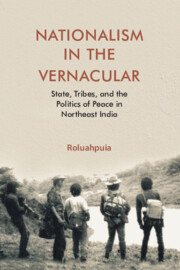Book contents
- Frontmatter
- Dedication
- Contents
- List of Figures
- Preface
- Acknowledgements
- List of Abbreviations
- Notes on Transliteration and Translation
- 1 Introduction
- 2 The ‘Tribal Question’ in India: Problem of Inclusion
- 3 The Emergence of Mizo Nationalism: The Formative Phase
- 4 The Mizo National Front and the Vernacularization of Nationalism
- 5 Violence, Counter-Insurgency, and the Transcript of Resistance
- 6 Discord, Accord, and the Politics for Peace
- 7 Conclusion
- Glossary
- References
- Index
1 - Introduction
Published online by Cambridge University Press: 30 April 2023
- Frontmatter
- Dedication
- Contents
- List of Figures
- Preface
- Acknowledgements
- List of Abbreviations
- Notes on Transliteration and Translation
- 1 Introduction
- 2 The ‘Tribal Question’ in India: Problem of Inclusion
- 3 The Emergence of Mizo Nationalism: The Formative Phase
- 4 The Mizo National Front and the Vernacularization of Nationalism
- 5 Violence, Counter-Insurgency, and the Transcript of Resistance
- 6 Discord, Accord, and the Politics for Peace
- 7 Conclusion
- Glossary
- References
- Index
Summary
In November 2018, a protest engulfed the state of Mizoram, demanding the removal of the state's chief election officer (CEO), S. B. Shashank (Figure 1.1). With just a month away from the state's assembly election, the protest came in the wake of the CEO's attempt to allow Bru refugees to vote in the election. The Mizos perceived the move as being politically motivated by the Bharatiya Janata Party (BJP) trying to gain support of the Brus and alienate the Mizos against the non-Christians of the state. Ethnic relations between the Mizos and the Brus have been strained since the 1990s, resulting in conflict and displacement, with many Brus fleeing to the neighbouring state of Tripura (Roluahpuia 2018a). The case of the Mizo–Bru tension is embroiled with the state electoral issue, particularly after the coming of the BJP in power at the centre in 2014. Given the party's ideology, the BJP did not find much appeal among the dominant Mizos, who are predominantly Christian. With this, the party shifted its focus onto the ethnic minorities of the state, the Brus, including the Chakmas—who mostly practise animism and Buddhism—as its support base. The final blow came when the centre agreed to the transfer of the state's principal secretary, Pu Lalnunmawia Chuaungo, a Mizo bureaucrat. This had further intensified the discontentment among the Mizos with major organizations, such as the Central Young Mizo Association (CYMA), the Mizo Zirlai Pawl (Mizo Student Federation) (MZP), and state celebrities, including sportspersons, coming out in the open to extend solidarity. An online campaign on various social media platforms demanding Shashank's removal galvanized like-minded netizens. Mizos from Manipur, Tripura, and different parts of India released a press handout to mark their solidarity.
In Mizoram's recent past, the protest to oust Shashank is one of the few political mobilizations that the state has witnessed on such a massive or extensive scale. It demonstrates that local politics, both electoral and ethnic, are entangled with the interplay of regional and national political interests. This is particularly true in the case of the Mizo–Bru ethnic tension. The case of the ethnic tension between the Mizos and the Brus has a longer history. Since the eruption of the conflict in 1997, various organizations such as the Rashtriya Swayamsevak Sangh (RSS) and the Vanvasi Kalyan have operated in the refugee camps of the Brus, mobilizing the community.
- Type
- Chapter
- Information
- Nationalism in the VernacularState, Tribes, and Politics of Peace in Northeast India, pp. 1 - 29Publisher: Cambridge University PressPrint publication year: 2023



